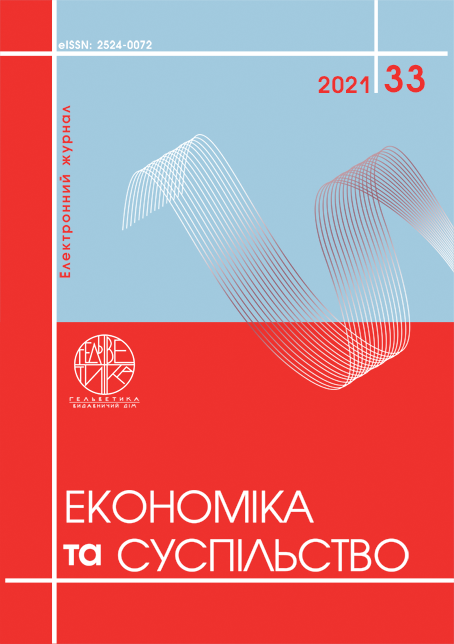СПІВРОБІТНИЦТВО КРАЇН БРІКС ЯК НОВИЙ ФОРМАТ ІНТЕГРАЦІЙНОГО ОБ’ЄДНАННЯ
Анотація
У статті розглянуто процес трансрегіоналізму як нового формату інтеграційного об’єднання країн, визначено його сутність та типологізацію. Охарактеризовано трансрегіональне об’єднання БРІКС, визначено його ресурсну базу. Проаналізовано економічний та політичний потенціал об’єднання. Визначено геостратегічні позиції країн БРІКС, їх роль та функції у системі міжнародного господарства. Наведено прогнозні показники темпів зростання економічного розвитку країн БРІКС у довгостроковій перспективі. Окреслено напрями грошово-кредитної політики об’єднання, спрямованої на зниження державного боргу та збільшення міжнародних резервів. Оцінено перспективи внутрішнього та зовнішнього співробітництва країн БРІКС. Визначено напрями посилення механізмів внутрішньої взаємодії угруповання та пошуку згоди з ключових питань глобального порядку.
Посилання
На пороге второго десятилетия БРИКС. Сборник статей / Отв. ред. В.Г. Хорос. Москва : ИМЭМО РАН, 2017. 83 с.
Хейфец Б. Перспективы институционализации БРИКС. Вопросы экономики. 2015. № 8. С. 25–42.
Paul T. V. Recasting Statecraft: International Relations and Strategies of Peaceful Change. International Studies Quarterly. 2017. Vol. 61, No. 1, P. 1–13.
BRICS Joint Statistical Publication 2021. SNAPSHOT. URL: https://brics2021.gov.in/brics/public/uploads/docpdf/getdocu-64.pdf
Бордачев Т., Панова В, Суслов Д. БРИКС и пандемия сотрудничества. Доклад Международного дискуссионного клуба Валдай. Апрель 2020. URL: https://www.globalaffairs.ru/wp-content/uploads/2020/04/doklad_briks-i-pandemiya-sopernichestva.pdf
Kastner S. L, Saunders P. C. Is China a Status Quo or Revisionist State? Leadership Travel as an Empirical Indicator of Foreign Policy Priorities. International Studies Quarterly. 2012. Vol. 56. P. 163–177.
Tkachenko S. L. BRICS and Development Alternatives, Rekindling the Strong State in Russia and China: Domestic Dynamics and Foreign Policy Projections, ed. by Bianchini, S. and Fiori, A., Leiden, Boston: Brill. 2020, Р. 271–297.
Horos, V.G. (Еd). (2017) Na poroge vtorogo desyatiletiya BRIKS [On the verge of the second decade of the BRICS]. Sbornik statej. Moskva: IMEMO RAN. 83 p. [in Russian].
Hejfec, B. (2015) Perspektivy institucionalizacii BRIKS [Prospects for the institutionalization of BRICS]. Voprosy ekonomiki, no 8, рр. 25–42.
Paul, T. V. (2017) Recasting Statecraft: International Relations and Strategies of Peaceful Change, International Studies Quarterly, vol. 61, no. 1, pp. 1–13.
BRICS Joint Statistical Publication 2021. SNAPSHOT. (2021) Available at: https://brics2021.gov.in/brics/public/uploads/docpdf/getdocu-64.pdf
Bordachev, T., Panova, V., Suslov, D. (2020) BRIKS i pandemiya sotrudnichestva [BRICS and the pandemic of cooperation]. Doklad Mezhdunarodnogo diskussionnogo kluba Valdaj. Aprel. Available at: https://www.globalaffairs.ru/wp-content/uploads/2020/04/doklad_briks-i-pandemiya-sopernichestva.pdf
Kastner, S. L., Saunders, P. C. (2012) Is China a Status Quo or Revisionist State? Leadership Travel as an Empirical Indicator of Foreign Policy Priorities. International Studies Quarterly, vol. 56, pp. 163–177.
Tkachenko, S. L. (2020) BRICS and Development Alternatives, Rekindling the Strong State in Russia and China: Domestic Dynamics and Foreign Policy Projections. Bianchini, S. and Fiori, A., Leiden (Eds.), Boston: Brill, pp. 271–297.


